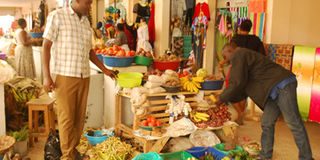Ankole residents feel the pinch of rising food prices

Traders sell foodstuffs at Mbarara Central Market on Tuesday. PHOTO | JULIUS BYAMUKAMA
What you need to know:
- A mini-survey carried out by the Monitor indicates that the food prices have for the last four months been increasing to the detriment of locals.
Residents of Ankole Sub-region have raised concern over the skyrocketing food prices.
A mini-survey carried out by the Monitor indicates that the food prices have for the last four months been increasing to the detriment of locals.
In Mbarara City, a 10 kilogramme sack of maize flour costs Shs35,000 up from the previous Shs25,000.
A kilogramme of groundnuts now costs Shs6,500 up from 5,000 while that of beans costs Shs4,000 up from Shs2,500.
The price of a sack of Irish potatoes has shot up to Shs300,000 from Shs230,000 while a basin of tomatoes costs Shs100,000 up from Shs70,000, and a basin of onions costs Shs40,000 from Shs30,000.
Mr Asaph Mugizi, the vice chairperson of Mbarara District Farmers Association (MBADIFA) and a member of the Banana Cooperative Limited, attributes the rise in prices to headline inflation that has since increased to 10.7 percent in the last 12 months up from 10 percent, according to the Uganda Bureau of Statistics (Ubos) annual headline inflation report.
Headline inflation is inflation-related to all the economy’s commodities, goods, and services.
“The change in climate has affected us but this could not push food prices as high as is the case today. Inflation and fuel prices have had a great impact on food prices.
“When fuel prices increase, farmers face challenges of transporting their produce to markets and the consumer feels the pinch since farmers are forced to increase the prices to offshoot the costs involved,” Mr Mugizi says.
He calls for the revival of farmers’ cooperatives to stablise prices and avoid middlemen exploitation.
“Also poor road infrastructure is to blame due to increased production costs. A bunch of matooke that used to be sold at Shs10,000 now goes for Shs30,000,” he adds.
Mr Dennis Kabyaija, a food dealer at Mbarara Central Market, says there is increased demand for food yet the supply is limited due to prolonged drought.
“Production has been low compared to demand but we are optimistic with the rains now on, production will increase and prices will go down,” he says.
Mr Nathan Byaruhanga Kabogooza, a trader in Bushenyi –Ishaka municipality, says there is an increase in the prices because heavy rain destroyed banana plantations and other crops.
Mr Samuel Nuwagaba, a farmer, and a resident of Kirundo, Kiyaga Parish in Bumbaire Sub County, says there is need for government to regulate prices.
“It’s a pity that some of these items are sold to business people at a cheaper price. These people get our matooke and milk cheaply and when you go to the market you pay a lot of money, which is unfortunate,” he says.
Mr Gadison Musimenta, a businessman at Rukungiri Central Market, attributes the high prices to scarcity.
“We get the commodities from far distances so we are forced to increase prices to allow us to raise money to facilitate their transportation,” he says.
Leaders speak
The Vice Chairperson of Ibanda Central Market Association, Ms Nalongo Matovu, says high food prices contribute to the increase in the cost of living and education.
“When these commodities increase, schools also increase school fees in order to keep in the business and it affects a common person,” she says.
Mr David Apuuli, a dairy manager in Bwizibwera Town, Mbarara District, says milk prices tend to rise due to the market demand.
“Prices of milk keep fluctuating depending on the market demand and what the big companies set. At the moment, we are buying a litre of milk at Shs800 from a farmer and selling it at Shs1,200 to buyers, however, big companies sell it at Shs2,000,” he says.
Prices in districts
In Bushenyi District, a bunch of matooke has increased from Shs12,000 to Shs35,000, a kilogramme of beans from Shs3,000 to Shs 4,000, a basin of Irish potatoes increased from Shs20,000 to Shs35,000, a kilogramme of maize flour from Shs2,000 to Shs4,500, a kilogramme of meat from Shs12,000 to Shs14,000.
In Ibanda Municipality, a bunch of matooke has increased from Shs10,000 to Shs25,000, pumpkin from Shs5,000 to Shs10, 000, a basin of tomatoes from Shs25,000 to Shs30,000, a basin of sweet potatoes from Shs20,000 to Shs30,000, a kilogramme of meat (beef) from Shs12,000 to Shs13,000, goat’s meat from Shs14,000 to Shs16,000.
In Rukungiri, a bunch of matooke costs between Shs25,000 and Shs30,000 up from between Shs10,000 and 15,000, a kilogramme of rice from Shs4,500 to Shs6,000, kilogramme of posho rose from Shs2,200 to Shs4,000, a kilogramme of millet flour rose from Shs3,500 to Shs4,000, a kilo of beans from Shs2,000 to Shs3,000, a kilo of cassava flour rose from Shs2,000 to Shs3,000 and a kilogramme of peas rose from Shs6,000 to Shs8,000.
Compiled by Felix Ainebyoona, Rajab Mukombozi, Julius Byamukama, Milton Bandiho, Elly Karenzi, Sheillar Mutetsi & Ronald Kabanza




